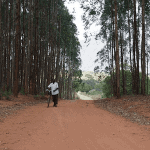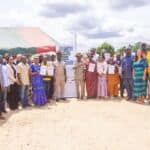Four Bottom-up Solutions to Strengthen Land Rights in Emerging Markets
Imagine for a moment you are a resident of an informal urban settlement, a slum, or a smallholder farmer living in sub-Saharan Africa, Asia or Latin America. It is likely you don’t have documents attesting to your property rights: no titles, deeds, or leases– despite having lived there for years, decades or generations. How do you think this affects your decision-making for your future? Would you invest in a new roof for your house knowing you don’t have a claim to the land? Would you develop irrigation systems for your farmland, or switch to high yield seeds and long-term crops that take years to mature? Land disputes are often in the headlines, whether it’s the Keystone pipeline or compromised indigenous land in Latin America. All over the world, mining, timber, or other companies receive government approval to access land, and then arrive to find communities occupying the land – communities that were not informed, and certainly did not consent to their land being utilized for a government-issued concession.
In many countries, the majority of citizens live without documentation or formal recognition of their property rights: an estimated 70 percent of land in developing countries. The effects of widespread tenure insecurity affect nearly every layer of society – from individuals and households to companies, investors and governments. Governments have started recognizing the need for improved land information and administration, seeing it as a fundamental constraint in development – and the donor community has worked to support land rights documentation programs globally.
But despite significant investment, there have not been massive improvements in protecting the property rights of most citizens. Several civil society and private sector organizations are working to address these gaps and ensure land rights for people most in need.
Developing the database
Top-down approaches, usually led by governments, have to date been standard for Europe and North America – but this isn’t necessarily working in places where governments don’t maintain sufficient databases. Cadasta, a nonprofit that specializes in land tenure technology, is changing this approach in developing countries. By working with partners, Cadasta develops digital tools to document, store, and analyze land and resource rights. The information is collected in a database that can be shared with governments.
“We have seen success working with local-level organizations from the bottom up – slum dwellers associations, microfinance institutions, or customary groups for example,” said Frank Pichel, Cadasta’s interim CEO and chief programs officer at a session at SOCAP. “These organizations are de facto-managing land data, even if it’s not within the formal legal framework. At this local level, we could get a basic system in place for managing data in a manner of days, at a very low cost.”
At the local level, organizations like Cadasta can step in to ensure that small community groups have the tools, training and mechanisms they need to illustrate their land rights; it gives them a voice.
Reaching last-mile households
For countries where systems are in place, one of the biggest gaps can be ensuring that the poorest people, who may be illiterate, are aware of how to navigate complex existing government land tenure systems. This challenge is especially pronounced in Bangladesh, a country where 96 percent of land is owned by men, as historically land was passed from fathers to sons. To make matters worse, about 70 percent of domestic violence issues, and 70 percent of court cases in the country are rooted in property rights. BRAC, one of the world’s largest non-governmental organizations, runs a property rights initiative with support from the Omidyar Network. The initiative ensures access to property rights for poor and vulnerable people, particularly women, using a variety of legal education, microenterprise land surveying services and technological interventions. It currently reaches more than 5 million people with its last-mile staff who ensure that communities are able to effectively navigate the often convoluted government system.
“BRAC acts as a reliable and transparent middleman for families seeking various land-related services,” said Ashley Toombs, manager of external affairs at BRAC USA. “Our staff and the community members we have trained are trusted experts in measuring land, mediating alternative dispute resolutions to avoid lengthy court proceedings, and helping people navigate complex government systems to ensure that rights are not being compromised in what is otherwise an incredibly corrupt and poorly understood system.”
BRAC also is piloting a social business to provide its services on a sliding scale for both families in need and those who are currently paying exorbitant prices for poor services. This initiative will fill in a significant gap, linking and enabling families at all socioeconomic levels, to engage with the country’s complicated system.
Cultivating Responsible Investors
Land tenure insecurity also leaves smallholders and communities vulnerable to displacement and exploitation within the land investment process. These “land grabs,” which have received increased attention from governments, civil society, and the development community, pose a significant risk to both businesses and affected communities. Even when efforts are made to engage with communities in attempts to respond to their needs, women and members of vulnerable groups are often left out of the conversation, with only the interests of men and elites represented.
“Companies and their investors play an important role in pushing for much-needed land reform,” said Niketa Kulkarni, senior research and evaluation specialist at Landesa, an organization focused on securing land rights for the world’s poorest people. “Consultations with affected women and men can ensure that their rights to land are protected, and grant companies the social license necessary to promote the long-term health of their investments.”
Considering the complicated web of international and domestic standards, as well as community norms that are often misunderstood, pursuing responsible land-related investments is no easy feat. For that reason, Landesa is developing a set of step-by-step guidebooks that equip companies, governments and communities with tools to achieve more responsible agricultural investments. The guidebooks offer field-tested, practical guidance to help all stakeholders implement investments that are in compliance with international best practices. Importantly, the guidance includes a specific emphasis on considering and addressing the needs of women throughout the investment process.
Getting on the map
In many cases, just knowing the specific location and area of a parcel of land is a major challenge. Mapbox, a location data platform for mobile and web applications, is working with various stakeholders to support the development of OpenStreetMap.org – a free, open, crowd-sourced map of the world. In 2016, Mapbox collaborated on a guide for organizations interested in using crowdsourcing data collection projects to create maps that will inform decision-makers – whether that be government, civil society, or private companies – who lack adequate geographic information about the location of settlements, infrastructure, and land use. This data is critical, but creating it in conventional ways can be expensive and time-consuming.
“Maps are incredibly powerful – especially when you don’t have them,” said Marena Brinkhurst, community team program manager at Mapbox, former program officer of the Community Land and Protection Program at Namati. “Without up-to-date or detailed maps it is very challenging for an NGO to run a program or disaster response effort, for a business to design a new development, or for a rural community or household to assert a claim of land ownership. OpenStreetMap offers an accessible platform for a wide array of people to collaborate on creating and maintaining a free, shared foundation of location information – even in places that have never been formally mapped.”
Whether providing a database for governments, assisting marginalized families in navigating formal property rights systems, supporting farmers, or crowdsourcing mapping projects – there are a number of initiatives growing momentum to address issues around property rights. For developing countries and local stakeholders, these projects illustrate a multitude of approaches that drive the innovative, bottom-up solutions required to break the mold and empower people and communities living off the cadastral grid.
Interested in reading more? BRAC and Landesa published an issue brief earlier this year supported by the Hilton Prize Coalition, highlighting the impact of land tenure on climate-change impacted regions.
Emily Coppel is communications manager at BRAC USA.
Tyler Roush is senior communications manager at Landesa, a global nonprofit that champions land rights for millions of the world’s poorest people, through pro-poor and gender-sensitive laws, policies and programs.
Top image courtesy of Landesa.
- Categories
- Agriculture, Technology



